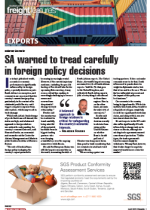The logistics challenges faced by table grape farmers in Cape Town have been a source of frustration and concern over the past few months. Farmers have been struggling to move their products out of the Port of Cape Town, which has resulted in significant delays and losses. With the demand for fresh produce continuing to rise, efficient and reliable logistics systems are critical to ensuring that agricultural products are delivered to consumers in a timely and cost-effective manner. According to AJ Griesel, CEO of the South African Table Grape Industry (Sati), the industry has made a concerted effort to build relationships with Transnet and liaise regularly with the state logistics operator.“We remain concerned about the situation at the port, as it directly impacts the sustainability of our industry,” he told Freight News. The situation highlighted the importance of effective supply chain management in the agricultural industry and the need for innovative solutions to address the challenges facing farmers and other stakeholders in the supply chain.“We are of the view that we need to seriously consider several short-term initiatives to ensure the season does not repeat itself. This includes the availability of functional equipment and streamlined processes to ensure efficiency and faster turnaround times. Fruit South Africa members continue to work collaboratively towards finding solutions, or at least alleviation measures, to these challenges,” he said.Load-shedding was another worry that had affected every stage of the export process, from harvesting and packaging to transportation and storage, said Jacques Ferreira, Sati commercial industry affairs manager.“It has posed a massive constraint on the industry. With the increased phases and frequency experienced this year, the industry has spent millions on alternative power sources to keep irrigation scheduling and product cooling intact to ensure product quality.”He said increasing production costs at a rate higher than inf lation was worrying, while at the same time South African exporters were facing increased competition from other Southern Hemisphere producing countries.“The agricultural sector also has to contend with unusual weather conditions that we experience from time to time. This season, the Orange River region in the Northern Cape, for example, was impacted by unusual weather patterns and volumes decreased by 18% from an originally predicted 19.5 million cartons to 16.4m cartons (4.5 kilogram equivalent).”He said overall export volumes this season had been lower than initially anticipated, largely due to the unfavourable weather conditions experienced in some areas. While actual figures have not yet been finalized, it is currently expected that South Africa will export 63.6m cartons of grapes during the 2022/23 season. This is approximately 18.2% lower than figures recorded in the previous season, and 11.4% lower than the original estimate.According to Griesel, next season’s export volumes are expected to total closer to an estimated 72m cartons (4.5kg equivalent). “The industry’s priority is to maintain quality arrivals, which are supported by efficient port operations and functioning infrastructure. Long term, however, we do not anticipate large growth in South Africa’s export volumes due to the focus on quality arrivals and the reduction of marginal cultivars,” he said.With about 75% of South Africa’s table grapes exported to the United Kingdom and the European Union, there have been efforts to grow other markets. “Over the past three years Sati has focused resources on its China Market Development Campaign, co-funded by the Western Cape Department of Agriculture, as part of a longer-term strategy to grow the country’s market share in the East,” said Griesel. “Shortly, we foresee focused efforts in the East, including South-East Asia, continuing, as well as further efforts in the USA.”Valued at approximately R10 billion and supporting close to 100 000 employment opportunities, the table grape industry’s contribution to the national GDP is significant.“For South Africa to remain competitive in an increasingly competitive market we need the basics to be in place,” emphasised Griesel. “If we want to just maintain the market share we currently enjoy, we need the support of the government to ensure that services such as electricity and logistics – road, rail, sea and air – are in good working order. We appeal to Eskom and relevant government departments to consider load-shedding exemptions during the respective table grape regions’ peak weeks. This will save the industry millions and contribute to sustainability.”

